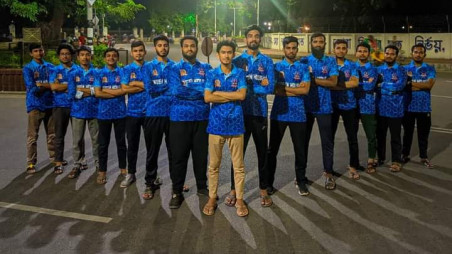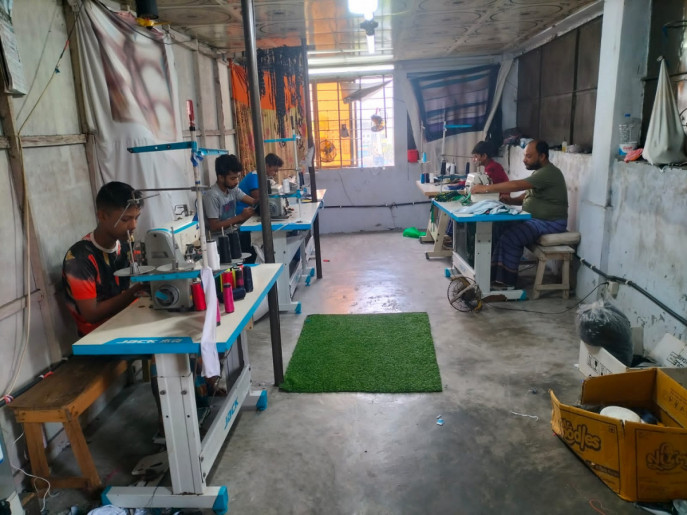Student-founded companies routinely provide custom jerseys and t-shirts for a wide range of events. The ripple effect of their efforts has extended beyond campus borders
At the heart of the custom t-shirt industry is the art of design, crafted to meet customers’ unique preferences, involving skilled designers and technologies. Photo: collected
“>

At the heart of the custom t-shirt industry is the art of design, crafted to meet customers’ unique preferences, involving skilled designers and technologies. Photo: collected
The University of Dhaka (DU) Interdepartmental Football Tournament, which ended on July 30, had a particularly festive look due to the jerseys worn by the players. These colorful outfits were also worn by students and teachers off the field.
This trend of personalized jerseys or t-shirts has spread far beyond the confines of the DU campus. We often see people wearing matching clothes at casual get-togethers with friends and even at office picnics. This practice has even seeped into family events such as birthdays and weddings, indicating a growing market for these products.
Realizing the importance of college campuses as a hub of social, political and cultural activity alongside established entrepreneurs, many students have also entered the t-shirt business.
These student-founded companies routinely provide custom jerseys and t-shirts for a wide range of events. The ripple effect of their efforts has extended beyond campus borders, even reaching the international stage.
Many people see the demand for custom t-shirts, but not everyone has the courage to get involved in the business while being a student.
Tanjim Khan, a student in the 2019-20 DU session, was an exception. Shortly after he arrived at university, the Covid-19 pandemic began. Like everyone else, he had to return to his village.
But soon, he returned to Dhaka with the aim of doing something with the meager amount he was earning from taking coaching courses.
On the advice of a senior, he ventured to sell seasonal fruits on campus. Not getting enough response, he got into the T-shirt business, both wholesale and retail.
Photo: collected
“>

Photo: collected
He eventually started selling jerseys and gradually his company “Dokan” started gaining the trust of the college community. Reflecting on his journey, Tanjim attributes his success to the unwavering support of his family and peers on campus.
“When I first sold mangoes, many of my peers called me the mango man. Then, when they saw that the clothing business was growing, they started supporting me. My family, campus seniors and my friends – everyone helped me,” Tanjim said.
After that, he never had to look back. His “Dokan” is now one of the most trusted custom jersey brands on the DU campus.
The owner of “Jersey Tong”, Maruf Hasan, has a similar success story. In fact, most of the students who started this business have the same beginning. At first it is difficult for them and some of them do not get enough support from friends and family.
Even with support, starting a business, even at a young age, is not easy. Some could not survive even after a successful launch. But those who stuck with the company from the start have now succeeded.
Once their journey begins, many entrepreneurs end up gaining momentum in this industry. But it takes a lot of hard work and perseverance. Universities do the rest by organizing various festivals and events.
For example, Maruf Hasan made jerseys for 12 departments in the interdepartmental football tournament. He claimed to have made custom jerseys and t-shirts for more than 200 events.
After debuting in 2019, Tanjim has always been under pressure when it comes to orders. However, the workload is highest before any special tournament or annual festival. Also, winter, especially when a new group is going to college, is a busy time.
Design and technology
At the heart of the custom t-shirt industry is the art of design, crafted to meet customers’ unique preferences. Achieving this requires skilled designers and technology.
Mokhleshur Rahman, a law student at Jagannath University, said, “By balancing my studies and business, I overcame the initial hurdle of sourcing good quality raw materials and now I am collaborating with various organizations. to design and manufacture t-shirts. »
Photo: collected
“>

Photo: collected
The heart of this process is ‘sublimation’ technology, a method that transfers designs from paper to fabric using heat presses. As businesses thrive, some students invest in their own printing facilities and factories, while many form partnerships with established factories to future-proof their operations.
The projects undertaken by these enterprising students transcend campus boundaries and reach international horizons. Tasnimul Islam, inspired by his brother’s association with the Bangladesh national archery team, took up the business of making custom jerseys.
Leveraging their sports connections, Tasnimul and his brother quickly turned their business into a thriving one. Their customer base now extends beyond the college campus, reaching out to sports clubs and organizations across the country and even getting orders from overseas.
The recent creation of shirts for the Maldives national cricket team underscores the global reach of their business. These achievements reflect a shared sentiment among these entrepreneurs – a mixture of enthusiasm for international projects and gratitude for Bangladesh’s reputation in the garment industry.
A common question arises: does involvement in business during graduate school hinder academic progress? Although many recognize a slight impact on studies during peak periods, all agree that education remains a priority.
Dr. Mohammad Zakir Hossain Bhuiyan, Professor in the Department of Marketing at Dhaka University and Director of Suryasen Hall, emphasizes the importance of entrepreneurship. He said, “Students should strive to be entrepreneurs rather than just job seekers. But they shouldn’t forget about their academic responsibilities.”


